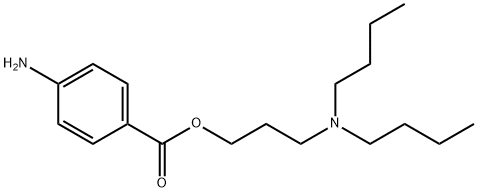40 g p-nitro-gamma-bromo-propylbenzoate and 40 g dibutylamine are heated
together at 60°C, for four hours. The excess dibutyl amine is removed by
washing the product with water and then steam distilling the residue. The
material remaining in the flask is taken up in benzene and treated with
aqueous hydrochloric acid. Part of the p-nitrobenzoyl-gamma-di-nbutylamminopropanol
hydrochloride thus formed goes into the water layer,
while most of it separates as a heavy oily layer. This, together with the water
layer, is separated from the benzene layer, made alkaline, and the resulting
base taken up in benzene. Upon removal of the solvent, the desired pnitrobenzoyl-
gamma-di-n-butylamminopropanol is obtained.
The p-nitrobenzoyl-gamma-di-n-butylamminopropanol is reduced by warming
to about 60°C with an excess of iron filings and a small amount of
hydrochloric acid for four hours. The material is then allowed to cool,
neutralized with dilute sodium hydroxide solution, and extracted with ether.
Upon the removal of the ether, the free base, para-aminobenzoyl-gamma-din-
butylaminopropanol, remains behind as an oil. It is exactly neutralized with
aqueous hydrochloric acid and the resulting solid salt purified by
recrystallization from water or a suitable organic solvent. It melts at 151°-
152°C (corr.) after drying at 100°C.
